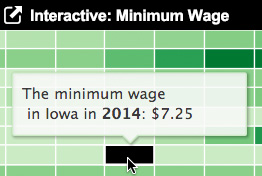What’s Behind Restaurant Workers’ Faster-Rising Paychecks?
/Last year, restaurant workers received bigger raises than workers in most other jobs.
Is it because the minimum wage increased in recent years in 24 states? Or is it because people are eating out more, demanding restaurant owners to increase pay for grill cooks, waitresses and dishwashers, etc.?
It's a combination of both.
Restaurants have hired at a faster pace than the typical company since the middle of 2010. Food workers’ hourly pay grew 3.1% last year after growing less than 2% a year for several years. That could show there’s a bigger need for restaurant workers than people willing to take those jobs for minimum-wage pay.
“The jobs recovery has been concentrated in lower-wage sectors, particularly the restaurant and hospitality area,” said David Smith, a labor economist at Pepperdine University. “There’s a lot of demand for those types of workers, and that’s causing wages to inch up.”
Hospitality, which includes restaurants, has accounted for about one in six jobs added anywhere in the country since economic growth started ticking up in mid-2009.
At the same time, many states have raised the minimum wage that employers must pay their workers. Big states, such as California, New York and 15 others, raised the minimum wage in 2014. Even more raised pay at the start of this year.
For example, California’s July 2014 increase to $9 an hour resulted in a 12.5% raise for minimum-wage workers there. The federal minimum wage has remained $7.25 an hour since 2009.
Wage mandates from states are forcing many restaurants to pay their employees more. Nearly half of workers earning the minimum wage in 2013 worked in food service, according to the Labor Department.
“I don’t know if we can disentangle minimum wage effects,” Deutsche Bank chief U.S. economist Joe LaVorgnasaid of rising restaurant pay.
Restaurant workers say they’re benefiting from raises that go beyond minimum-wage bumps. In some states, the minimum wage increased by less than than a quarter an hour.
Kevin Montgomery, 23, left a minimum-wage job at a grocery store to take a slightly better-paying position at Pi Pizzeria in St. Louis. Since he started as a prep cook in 2012, he has received several raises, including a 16.5% bump given to all kitchen staff last year. Pi’s ownership gave across-the-board raises as part of an effort to reduce turnover and attract better workers.
Mr. Montgomery now earns $11.75 an hour, well above Missouri’s $7.65-an-hour minimum wage.
“I can actually start saving money, save it for a car, and have a savings account,” he said. The extra money allowed him to return to school. He’s learning the welding trade and his managers have agreed to work around his class schedule. He’s eying an Acura TL or Nissan Altima.
“Morale at the restaurant has gone way up” since the staff received raises last summer, he said. “They say money can’t buy happiness, but in this case, it kind of did.”





